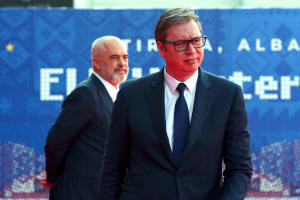EU seeks to reassure Western Balkans on accession amid fears of Russian
influence
 Send a link to a friend
Send a link to a friend
 [December 06, 2022]
By Fatos Bytyci and Sabine Siebold [December 06, 2022]
By Fatos Bytyci and Sabine Siebold
TIRANA (Reuters) -European Union and Western Balkans leaders met in the
Albanian capital Tirana on Tuesday for a summit meant to reassure the
region of a future in the wealthy bloc amid fears of rising Russian and
Chinese influence.
The leaders of the six Balkan countries of Albania, Bosnia, Kosovo,
Montenegro, North Macedonia and Serbia have long expressed disillusion
that negotiations have not started or are stalled, years after being
promised eventual EU membership.
While reluctance over further enlarging the EU is rife among member
states, Russia's invasion of Ukraine has pushed them to focus more
energy on bringing the region closer to the bloc.
"I am absolutely convinced that the future of our children will be safer
and more prosperous with the Western Balkans within the EU and we are
working very hard to make progress," EU Council chief Charles Michel
said at the start of the meeting.
In a concrete step towards integration, telecommunications operators
from the EU and the Western Balkans leaders signed a deal at the start
on the summit on a cut in data roaming charges from Oct. 2023.

While some of the Balkans leaders welcomed that step, they stressed they
wanted more.
"Kosovo will be submitting its application for EU membership by the end
of this year," its president, Vjosa Osmani-Sadriu, said, adding that she
hopes an EU summit next week will approve visa liberalisation for
Kosovo.
Meanwhile, Belgian Prime Minister Alexander De Croo hinted that the path
to accession will still be long for Western Balkan countries.
"We know that there is progress, we know that there is an ambition to
make this progress work faster ... but there is no shortcut," he said.
RUSSIA
Old tensions within the region were also clear as Kosovo's president
criticised Serbia's attitude and said Kosovo was "100% aligned" with EU
views.
"Whether you stand with Ukraine today or you stand with Russia should
matter, whether you have sanctions against Russia or not should matter,"
Osmani-Sadriu said.

[to top of second column]
|

Albania's Prime Minister Edi Rama and
Serbia's President Aleksandar Vucic arrive for the EU-Western
Balkans summit in Tirana, Albania, December 6, 2022. REUTERS/Florion
Goga

Serbian President Aleksandar Vucic said as he arrived at the summit:
"Is Serbia too close to Russia? Serbia is an independent country."
Serbia, he said is "on the EU path and that will remain so," but
also needs to defend its own interests.
The EU's aim is to give greater stability to a region that emerged
from the break-up of Yugoslavia and the ethnic wars of the 1990s but
is still racked by tensions.
But moves towards closer integration are also designed to deny
Moscow a gateway for causing trouble at what is seen as a soft spot
on the 27-nation EU's southeastern flank.
Serbia in particular, which was bombed by NATO two decades ago, has
long struggled to balance historically close ties with Russia
against aspirations for integration with the West.
"At a time when European security environment is challenged by
Russia, it's very important we have a common table where we can
discuss these matters," Finland's Prime Minister Sanna Marin said.
EU leaders will also push their Balkans counterparts to be more
forceful in implementing EU standards such as the rule of law,
gender equality and the fight against corruption, while aligning
with EU policies such as the sanctions on Russia.
At the same time, the EU has been working hard to plug what it sees
as loopholes in the visa regimes of several Balkans countries that
have helped boost the number of migrants crossing into the bloc.
Meanwhile Albanian Prime Minister Edi Rama stressed it was important
that an EU-Western Balkans summit was held in the region for the
first time.

"It is very strong sign of awareness of the EU that the EU needs the
Western Balkans as much as the Western Balkans needs the EU," he
said, while adding that holding the summit in Tirana helped make it
"rock and roll ... it's far less boring than Brussels."
(Additional reporting by Benoit Van Overstraeten, Ingrid Melander,
Sudip Kar-Gupta, Andreas Rinke;Writing by Sabine Siebold and Ingrid
MelanderEditing by John Chalmers and Frank Jack Daniel)
[© 2022 Thomson Reuters. All rights
reserved.]
This material may not be published,
broadcast, rewritten or redistributed.
Thompson Reuters is solely responsible for this content. |